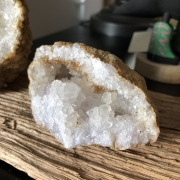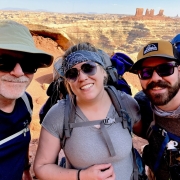It’s All About the Engine, Part 3 | Healthy Aging Series: S10 E3
I attended college in Portland Oregon. I lived in the upstairs of a house owned by Mr. and Mrs. Peters. 2705 Brooklyn St. Rent was $75 a month. It was 1980. I remember Mr. Peters was in his late 80s. He was sharp as a tack, always reading the Bible, always listening to Christian radio programs. I would come home from work and school in the evenings and his radio was blaring Dr. J. Vernon MCGee’s “Through the Bible Hour.” He could barely hear, and he would forget to turn down the radio. He was a retired painter and had invented an attachment for ladders to help maintain stability while leaning against the house. Mrs. Peters was a gem as well.
Mr. Peters had been active most of his life as a painter. He had a strong support system through his church and family and was seemingly free from any neurological disease. He exercised his brain every day via Bible studies even in his late 80s. Maybe Mr. Peters is lucky too. I don’t remember him talking about any of the brain landmines, mines like Alzheimer’s disease or dementia. His brain seemed mostly intact, free from neurological disease. And I’m making assumptions about things like his diet. I would see him work or piddle around the yard or in his garage. For a man his age (I almost always hate to hear that phrase), he appeared to be aging well, which included a healthy brain.
This, of course, begs the questions: How do you take care of your brain? What can you do to ensure that our brains remain as healthy as possible as we age?
Here are three assertions I want to make about your brain, your body, and your health:
If you want a healthy mind, you need a healthy brain.
If you want a healthy brain, you need a healthy body.
There are things that you can do to have a healthy body.
You cannot disconnect your brain from your body!
Well, that’s four assertions!
So let’s look at what it takes to care for your brain. I’m separating “BrainCare” into several parts.
Part One will explore exercising your body, having positive, social interactions, and learning how-to-do-good brain gymnastics
Let’s get started!
The most important thing you can do for your brain is to exercise your body. I exercise 8 to 12 hours a week, mostly walking and hiking and resistance training. I love Jefferson Memorial Forest and The Parklands. In a recent New York Times article, it asserted that whatever health problems you have they can probably be solved by walking. Google and read it! I walked 350,000 steps in March. More in April. Some of that included 35,000 steps a day I hiked out to Plateau Point in the Grand Canyon. Besides walking, I cycle during the summer, 15 to 20 miles a week, through sections of Broad Run Park, my park. They are all my parks. I lift weights three times a week. I stretch 1 to 2 times a week. I’m not going to bore you with studies in details, but here are the results of several longitudinal studies:
People who regularly exercise were less likely to experience cognitive impairment as they age. Google, “exercise and the brain.”
FYI: I’m working on an episode for this season entitled, “BDNF, your BFF!” BDNF stands for Brain-Derived Neurotrophic Factor. BDNF helps the brain to develop new connections, repair failing brain cells and protect healthy brain cells. BDNF helps your brain grow stronger and there are things you can do to increase your BDNF levels. Guess what one of those things are? You guessed it…exercise. I can’t wait to post it!
Next, you have to work out your brain the same way you work out your body. The bad news is, as you age, you lose white and gray matter. The good news is, because of neuroplasticity, you can grow your brain by working it out.
You can have a bigger brain by exercising your brain!
Two Types of Workouts for Brain:
First, study! I study. I don’t just read, I study. And then I write. I learn new things. I’m studying people’s lives and currently studying and reading about the brain. Anytime you read about neuroplasticity you hear about the study of the cab drivers in London. They were required to memorize 25,000 streets over the period of 2 to 3 years. Their brains got bigger. Do you want a stronger brain? Spend your life learning new things.
Second, work on improving your processing speed. A new study shows that spending time throughout the week playing…(wait for it) Mario Kart, or games like Mario Kart can improve your memory processing speed. As I shared in an earlier episode, your brains processing speed is one of the things that declines as we get older. Here’s a way to fix that problem! Forget about the sudoku or crossword puzzles. Don’t quit doing them; Just realize they provide a minimum amount of exercise for the brain when it comes to processing speed. But anything you do is going to help you! Crossword puzzles, sudoku, brain teasers, or anything else that gets you to think is going to help you improve your brain. I’ve played the guitar many years of my life but have not been able to do it much in the past five years. I’ve set up my guitar in my office, and I’m going to start learning how to play new songs, because any time you learn new things, study new things, practice brain skills, you are getting a stronger brain. FYI: I purchased a Switch and a Mario Kart game to test the theory. I’ll let you know the results in an upcoming blog.
So, here is part one of how to have a healthy brain blog. We looked at exercise, developing a positive, social support network, and brain gymnastics.
Having a healthy brain is a no-brainer!












